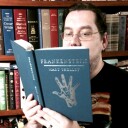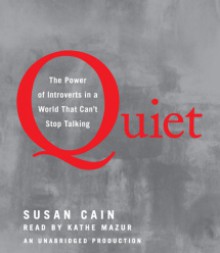
NEW YORK TIMES BESTSELLER • Experience the book that started the quiet revolution
At least one-third of the people we know are introverts. They are the ones who prefer listening to speaking; who innovate and create but dislike self-promotion; who favor working on their own over working in teams. It is to introverts—Rosa Parks, Chopin, Dr. Seuss, Steve Wozniak—that we owe many of the great contributions to society.
In Quiet, Susan Cain argues that we dramatically undervalue introverts and shows how much we lose in doing so. She charts the rise of the Extrovert Ideal throughout the twentieth century and explores how deeply it has come to permeate our culture. She also introduces us to successful introverts—from a witty, high-octane public speaker who recharges in solitude after his talks, to a record-breaking salesman who quietly taps into the power of questions. Passionately argued, superbly researched, and filled with indelible stories of real people, Quiet has the power to permanently change how we see introverts and, equally important, how they see themselves.
- ISBN10 1415959137
- ISBN13 9781415959138
- Publish Date 24 January 2012
- Publish Status Unknown
- Publish Country US
- Imprint Random House Audio
- Format Audiobook
- Duration 11 hours
- Language English
Reviews


herseriallife

Amber (The Literary Phoenix)
And what an interesting time to listen to this audiobook as well! COVID-19 is a fascinating lens for personality traits, because crowds/isolation affect the different personality traits very differently. When I’m at home, I feel more comfortable. More recharged. I don’t have eons of extra time and energy because I’m already driven to solitary tasks, but for the first time in my life, it feels like being an introvert is an advantage.
It’s interesting because Cain talks about how the Extrovert Ideal is an American machination, whereas other countries do value quieter, more passive personality traits. I think the success of this book to its reader will depend upon the motivation of the reader. For me, I knew this was a book about introverts, and what it’s like to be an introvert, and I felt heard. Like… apparently other people go to hide in the bathroom when people are being too much and I very much thought it was just something I did, and needed to stop doing because bathrooms are gross (but also where else can I get that kind of privacy in public? Gah!).
Each chapter deals with a different aspect of introversion vs. the world. Some chapters discuss finance, others discuss career, or workplace dynamics, or how to raise an introvert. Some chapters were more interesting than others, but as a whole, there are so many people I would love to give this book to… just so they understand that loud and social is not necessary better. I appreciated the scientific approach Cain took, and I just… I found myself sighing in relief. Because, if I needed it, this book told me that it’s okay not to love networking, and social gatherings, and group brainstorming discussions.
Extroverts, read Quiet so you can understand your less outgoing friends, family, and coworkers. Introverts, read Quiet just to know you are perfect the way you are. Even though your culture may not support you.

ibeforem
The book is split into 4 parts. In the first part, the table is set and we learn the difference between extroverts and introverts and how society favors extroverts, as well as some of the historical and cultural implications of this. The second part focused on how our extroversion or introversion can be determined by our biology, and how it affects our decision-making and other aspects of our life. This section felt sort of business-centered, and I got bogged down and bored with it a little.
The third section and fourth sections were my favorites. The third section dealt with culture, and how different cultures value introversion. And the fourth was all about communication, particularly between two partners who are at different points in the spectrum as well as how to approach and understand introverted children in a beneficial way.
I think everyone will recognize themselves at some point of this book, no matter how introverted or extroverted you are. I think it can be especially useful for parents or teachers who have introverted children/students and aren't sure how to work with them.
I listened to the audio version, and give it a thumbs up!

Michael @ Knowledge Lost
Quiet is a book that seeks out to explain the need for introverts, while also looking at the history between these two personality types. I myself am extremely introverted and my Myers–Briggs Type Indicator is INTJ (this can change over time but I will not go into that at the moment). I found it useful to understand the history in how society deals with introverts; some of which still feels very relevant today. I remember reading sections focusing on the 1950s and 60s, thinking this happened to me and is still happening in today’s society. This leaves me to think that people do not have an understanding on the personalities and how to manage introverts.
Susan Cain goes into a lot of detail with suggestions on how to fit into such an extroverted world, from developing a pseudo-extroverted personality to finding a quiet place to work. Obviously it does depend on your different situations but I think there were some interesting ideas to implement. She also goes into the problems with open offices and productivity levels as well as the extroverted nature of church. I was surprised by just how much this book covered.
I really enjoyed Quiet and feel like I learnt a lot, however it just makes me want to learn more, especially about the history (it is a vicious cycle). I want to give this book to my parents because I think they might actually benefit in learning about the topic. In fact I want to give this book to everyone, I feel like it is an important topic and we need to know that people are different and need to be treated differently. This is another book to fulfil my passion for learning about psychology and I would happily take some recommendations based on this book.
This book originally appeared on my blog; http://www.knowledgelost.org/book-reviews/genre/non-fiction/quiet-by-susan-cain/

wyvernfriend
If you want to understand introverts you could do worse than this book.

adamfortuna

MurderByDeath
This is a great book. As I've said, I've always known I'm an introvert, but I had no idea what that meant in terms of showing affection, conflict resolution - even my nervous system! Reading this was a great breath of fresh air for me - I'm not 'broken' because I can't 'fight' the 'right' way and I can't always control my need to run in the opposite direction from social events larger than 4 people. Other themes that struck a chord: guilt, the need to please, the feelings of devastation at the slightest sign of disapproval, amongst so many others.
From a management perspective - well, I wish this book was required reading for anyone managing a number of people. I work in an "open office plan", and while I'm an introvert, I'm not shy, so it's a daily battle not to turn around and yell at everybody to shut the hell up - or run screaming out of the room myself.
I don't have children, but the last part of the book did a wonderful job touching on the subject of introversion in children and their experiences in the educational system. I never got the standard "do you speak English"-type comments growing up, but my mother had to deal with 12 years of "your daughter is extremely bright but has an attitude problem" - until I read this book I NEVER understood this as all I ever wanted to do was please my teachers.
All in all, a very eye-opening read. For Introverts, it's an affirmation. For extroverts with introverts in your lives, hopefully reading this book will make understanding us a bit easier. :)
I listened to the audio and while the narrator was excellent, I think this might be a book I'd like to own in print for easy reference in the future.

Briana @ Pages Unbound
Review: Quiet features a wealth of interesting facts and observations about introversion but presents them to the wrong audience. Cain focuses on and directly addresses introverts who have low self-esteem, often due to lifetime experiences of being told there is something innately wrong with them and their desire for quiet—the type of person who, like Tom on pg. 134, exults that now that he finally understands his own introversion, “I don’t need to feel apologetic or defensive in any way.” Cain clearly knows a lot of this type of introvert, enough to fill her book with examples of them and their worries. She fails to recognize, however, that there are introverts who are already happy with themselves, and her book does not address them. She also fails, until the final section, to take much advantage of the good her book can do by explaining introverts to extroverts. With such a limited audience, the book often takes on a tone of affirmation, which can seem odd or even condescending to those who do not need it.
Cain’s writing in general is not particularly engaging or lively, and the content of her book must be what hold her readers’ attention. The organization is often choppy, as the discussion flits from anecdotes to scientific studies to profiles of introverted historical figures. The short sections, usually lasting only a page or two, can help readers feel as they are moving quickly through the book—but they can also break concentration and contribute to the feeling Cain does not have too much of an attention span herself. The inability of any single topic to feature in more than two consecutive pages also builds the impression the discussion is superficial, even if it is not. Cain often returns to discuss a topic further several pages later.
And the subjects Cain introduces are fascinating. She explores the rise of the extroverted ideal in Western culture, summarizes scientific studies that have looked for the roots of introversion in our bodies, and suggests ways introverts can cope with living in an extroverted world. Theoretically, her goal is reaffirming the values of introversion—which can include having deep conversations, being more observant, the ability to concentrate for longer periods of time, and more. However, she spends a decent number of pages discussing how introverts can improve at pretending to be extroverts, without spending too much time answering a question she raises herself—whether they should.
The conclusion, however, may be the most interesting—or at least most practically useful section—as it addresses extrovert/introvert “mixed” couples can learn to understand each other better and how extroverted parents can raise introverted children. Cain even takes on the American educational system, arguing that introversion is a learning style, similar to being a visual, aural, or tactile learner, and that forcing introverted students to work in large groups or constantly speak in front of a class is not necessarily the most beneficial route a teacher can take. As schools increase emphasis on group learning, this is a message that should be brought to the attention of more educators.
Quiet may not have a lot of new information for introverts. Most of them probably already know that too much noise can make them tired, that they can give speeches better if they prepare than if forced to take extemporaneously, that they brainstorm better alone than in public groups where they feel judged. Nonetheless, there is inevitably some value in seeing that there are scientific studies backing up the observations they are already made in their daily lives. The book will certainly be enlightening for many extroverts, particularly as evidence suggests introverts are better at understanding extroversion than extroverts are at understanding intoversion.
Still torn on whether to read Quiet? Here are a few more ideas presented in the book:
“Leadership does not only apply in social situations, but also occurs in more solitary situations such as developing new techniques in the arts, creating new philosophies, writing profound books and making scientific breakthroughs” (Janet Farrall and Leonie Kronberg qtd. 78).
“We’re so impressed by the power of online collaboration that we’ve come to overvalue all group work at the expense of solo thought. We fail to realize that participating in an online working group is a form of solitude all its own. Instead we assume that the success of online collaborations will be replicated in the face-to-face world” (89).
“At the university level, introversion predicts academic performance better than cognitive ability” (167).
